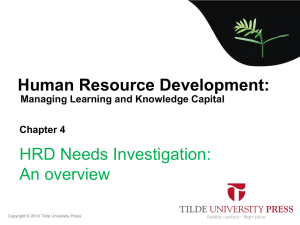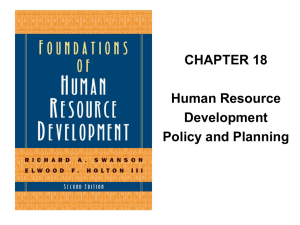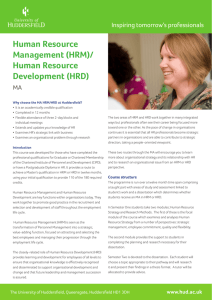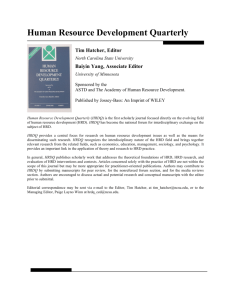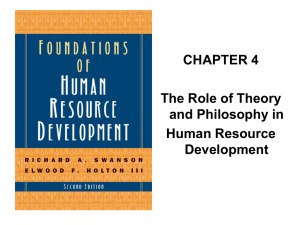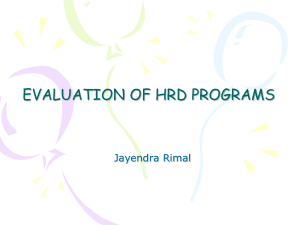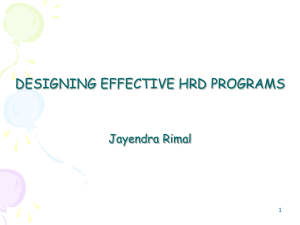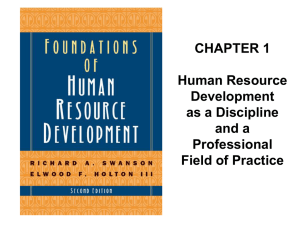Human resource development: key organisational process in a
advertisement
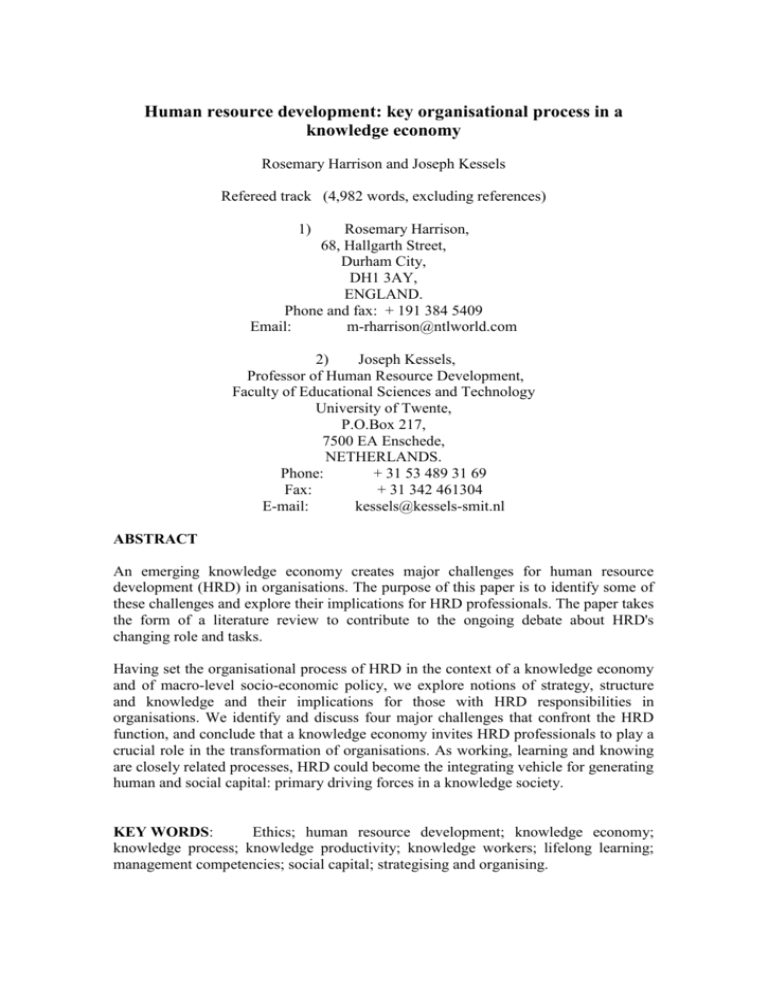
Human resource development: key organisational process in a knowledge economy Rosemary Harrison and Joseph Kessels Refereed track (4,982 words, excluding references) 1) Rosemary Harrison, 68, Hallgarth Street, Durham City, DH1 3AY, ENGLAND. Phone and fax: + 191 384 5409 Email: m-rharrison@ntlworld.com 2) Joseph Kessels, Professor of Human Resource Development, Faculty of Educational Sciences and Technology University of Twente, P.O.Box 217, 7500 EA Enschede, NETHERLANDS. Phone: + 31 53 489 31 69 Fax: + 31 342 461304 E-mail: kessels@kessels-smit.nl ABSTRACT An emerging knowledge economy creates major challenges for human resource development (HRD) in organisations. The purpose of this paper is to identify some of these challenges and explore their implications for HRD professionals. The paper takes the form of a literature review to contribute to the ongoing debate about HRD's changing role and tasks. Having set the organisational process of HRD in the context of a knowledge economy and of macro-level socio-economic policy, we explore notions of strategy, structure and knowledge and their implications for those with HRD responsibilities in organisations. We identify and discuss four major challenges that confront the HRD function, and conclude that a knowledge economy invites HRD professionals to play a crucial role in the transformation of organisations. As working, learning and knowing are closely related processes, HRD could become the integrating vehicle for generating human and social capital: primary driving forces in a knowledge society. KEY WORDS: Ethics; human resource development; knowledge economy; knowledge process; knowledge productivity; knowledge workers; lifelong learning; management competencies; social capital; strategising and organising. 1 Human resource development: key organisational process in a knowledge economy HRD AND THE EUROPEAN AGENDA IN A KNOWLEDGE ECONOMY, Competition and collaboration in a knowledge economy In an economic environment where knowledge is becoming the main organisational currency, firms must be able to learn fast, respond to recurrent unfamiliar challenges, and ensure that their workers can construct and share strategically valuable knowledge as well as acquire technical and interactive skill. For over a decade the 'dizzying pace' of technological change (Bettis and Hitt, 1995) has been stimulating globalisation - a process directly linked with the Internet and the pricing and information revolution that it has made possible. A major consequence of the conjunction of an emerging knowledge economy and increased globalisation is that innovation and flexibility rather than efficiency have become the main drivers of value. Companies that do not quickly learn to co-create value with their customers and capture the intelligence that illuminates what those customers value will soon lose competitive advantage (Prahalad and Ramaswamy, 2002). In this turbulent environment competitive advantage relies on capability to adapt to new and unfamiliar challenges by generating and applying new knowledge to continuous improvement and radical innovation in work processes, products and services and to customer relationships. It is the purpose of this paper to identify and explore the major implications of a knowledge economy for those who have core responsibilities for learning and development of people in organisations. At this point, therefore, it is relevant to introduce the concept of HRD as an organisational process. 2 HRD: The organisational process Although the strategy literature has for some time contained a distinctive strand on organisational learning and on knowledge management, there is still surprisingly little on HRD as a key process for organisations operating in a knowledge economy. One major United Kingdom (UK) report (Stewart and Tansley, 2002) has reviewed new roles and tasks for trainers in such an economy, and a European research project has examined HRD strategies and practice in nearly 200 'learning oriented' organisations across Europe (Tjepkema, Stewart, Sambrook, Mulder, Ter Horst and Scheerens, 2002). However, much of the United States (US) and European literature on HRD is in reality primarily about training, and we argue that HRD comprises far more than that. The term has many interpretations, but in our view: HRD as an organisational process comprises the skilful planning and facilitation of a variety of formal and informal learning and knowledge processes and experiences, primarily but not exclusively in the workplace, in order that organisational progress and individual potential can be enhanced through the competence, adaptability, collaboration and knowledge-creating activity of all who work for the organisation Research provides evidence that, however they are titled, HRD functions tend to be preoccupied with learning inputs, with the improvement of individual performance and with training-dominated activity (Bournois, Chauchat and Roussillon,1994; Larsen, 1994; Ashton, Sung, Raddon and Powell, 2001; Stewart and Tansley, 2002; Tjepkema et al. 2002). Our definition infers that if the HRD process is to add critical value in a knowledge economy, then there is a need for a fundamental shift from this preoccupation with immediate performance improvement to a strong focus on lifelong learning and work-based learning strategies. In a knowledge economy HRD professionals need to turn their attention to learning processes that can produce and disseminate knowledge to enhance the organisation's capability to continuously improve and to radically innovate. The focus of HRD activity needs to be on learning outcomes and on making an organisational contribution (Stevens, 2001). 3 The European Agenda of Lifelong Learning Our definition reflects a perspective on HRD that is in accord with the current macrolevel policy emphasis on lifelong learning and development. One of the main tasks of public funded education is to invest in the development of a high level workforce. Across the European Community the need to invest heavily in human capital has for over a decade expressed itself in a drive for life-long learning. This drive informs national vocational education and training policies in member states (OECD 2001a; 2001b) and raises three issues relevant to this paper: 1. The need for the development of human capital to be a shared responsibility , whether at macro or micro levels of society OECD studies (2001a) stress the direct influence of better education and also of good healthcare, welfare, and social and political commitment in creating a climate for living and learning in which knowledge development can occur. In a knowledge economy co-operation and trust help to form the basis for networks in which the exchange of relevant information and collaborative approaches to generate new knowledge thrive (ibid). In a knowledge economy the encouragement of education, training and development is thus no longer the exclusive role of government. Firms, institutions and voluntary organisations have an equally important part to play in ensuring learning opportunities for their members. It follows that within organisations the same principle holds true: learning, and the development of knowledge on which economic and social well-being greatly depend, should be pursued through a genuine partnership process. This process is essential particularly because of the unique strategic value of tacit knowledge that is to say, of knowledge that is embedded deep in the individual or collective subconscious, expressing itself in habitual or intuitive ways of doing things that are exercised without conscious thought or effort (Nonaka, 1991). Tacit knowledge is the property of individuals and cannot be wrested from them. The learning that produces it must therefore rest upon a recognition of mutuality of interest and of responsibility between organisation and individuals. 4 2. The need to develop social as well as human capital The European agenda for lifelong learning is underpinned by concepts of human and social capital: Human capital: 'the knowledge, skills, competencies an attributes embodied in individuals that facilitate the creation of personal, social and economic wellbeing' (OECD 2001a:18). Human capital is developed in the contexts of family, early childcare setting, formal education and adult education, daily living and civic participation, as well as in formal training and informal learning at work and through activities such as research and innovation or participation in various professional networks. Social capital: 'networks together with shared norms, values and understandings that facilitate co-operation within or among groups' (ibid:41). Trust may be viewed as both a source and an outcome of social capital as well as being a close proxy for many of the norms, understandings and values that underpin social co-operation. We argue that in organisations where the tacit dimension of knowledge and its social construction form a vital source of competitive advantage the HRD investment should be focused strongly on the building of social capital, which is to do with the interactions of all workers in an organisation. Not only specialist knowledge workers but also personnel such as service worker, data workers and good-producing workers all belong to the networks of a knowledge activity system that enables continuous adaptation to a dynamic environment through improvement and innovation in work processes, products and services. Surely, then, the HRD investment must encompass the entire workforce? 3. The need to recognise organisational context as the major determinant of firms' HRD investment Organisations' investment in HRD is undoubtedly influenced by a mesh of external forces that include macro-level policies in the HRD field and country NVET 5 systems. However, this influence varies greatly from one country to the next, and indeed from one sector and organisation to the next (Sparrow and Hiltrop,1994; Ashton et al. 2001). Research repeatedly shows that HRD policies within the firm are most powerfully shaped by its internal context, most notably by top management's vision and values, by management style and actions at different organisational levels, by human resource (HR) strategies and practice in the workplace, and by the employment system of the firm (Ghoshal and Bartlett, 1994; Hendry, 1995; Patterson, West, Lawthom and Nickell,1997; Terry and Purcell, 1997). This emphasises the need for HRD professionals integrate their activity with wider HR and business practice in order to achieve HRD goals. We conclude from this section that: in organisations operating in a knowledge economy it is vital to develop social capital as well as individual human competence HRD professionals need to acquire a deep understanding of internal organisational context as well as of the external business environment, and work in business partnerships in their organisations. STRATEGISING AND ORGANISING IN A KNOWLEDGE ECONOMY The drive for flexibility Until the closing decades of the 20th century structure tended to be a static concept, primarily conceived of as policy - that is to say, the outcome of formal strategic decisions (see, for example, Chandler, 1962, Drucker, 1974, and Child, 1977). However in a knowledge economy regular structural reconfiguration of the firm must be integrated with continuing changes in strategy as current stocks and resources within the firm are redeployed and/or new are acquired (Pettigrew, Thomas and Whittington, 2002:17) and as the firm interacts with the customer to co-create value. Strategy and structure have to become interactive processes that drive and support continuous knowledge creation and the acquisition and use of expertise across 6 boundaries (Whittington, 2002; Venkatraman and Subramaniam, 2002). Skilful strategising and organising build two kinds of organisational flexibility: in producing new strategic responses as old recipes become obsolete, and in rapidly and regularly redeploying and co-ordinating the resources needed to implement those responses (Sanchez, 1995). Strategising needs to ensure that old ways of thinking and doing do not to dominate, locking in customary ways of thinking, inhibiting innovation and preventing progress (Bettis and Hitt, 1995). It must enable the creation of dynamic capabilities that rely on the 'economies of expertise' gained by leveraging intellectual capital and knowledge flows in a network of internal and external relationships (Venkatraman and Subramaniam, 2002; Eisenhardt and Santos, 2002). Underpinning the search in the literature for new organising principles lie three complementary notions of the organisation: as a reservoir of knowledge (Hedlund, 1994; Kogut and Zander, 1996; Whittington, 2002) as a portfolio of dynamic capabilities (Teece, Pisano and Schuen, 1997) as a network of relationships (Quinn, 1992; Miles and Snow, 1995; Baum, Calabrese and Silverman, 2000; Venkatraman and Subramaniam, 2002). Innovatory organisational designs are characterised by new management and organising logics founded on principles of self-organising and trust in bottom-up processes (Elfring and Volberda, 2001:282). However, research reveals that: all knowledge-creating enterprises face similar design questions (Whittington and Mayer, 2002). These are to do with the kinds of structure, routines and processes that can facilitate knowledge construction, transfer and integration, with how to ensure a productive interplay between explicit and tacit knowledge within and between organisations, and with how to organise for both routine and innovative activity in the organisation 7 there are no prescriptions for organising in an increasingly knowledge-based economy. Each firm must find its own structural response to the internal and external knowledge-creation issues that it confronts, and must ensure in so doing an effective interplay of organising and strategising processes (Venkatraman and Subramaniam, 2002: 471). The primary resources for the organising process are hard-to-copy technologies, organisational routines (such as budgeting, research and development arrangements, templates for organising work and control and planning routines), culture and socialisation processes, and relational competencies that allow the organisation to combine its unique resource with those of other firms, particularly those belonging to its value chain (Pennings, 2001: 241). The path-dependent nature of knowledge creation raises a need to understand the historical roots of these resources. Levels and types of knowledge that already exist in the firm, its past record of innovation, of innovatory design capability and of leadership and management, its past HR policies and their outcomes - all these contextual factors constrain or facilitate current strategic and structural options. We conclude from this section that: the new tasks for HRD professionals in a knowledge economy involve an ongoing coupling of HRD strategy and practices to the wider strategising process at all organisational levels, and a sensitivity to internal organisational context those professionals also need to ensure that learning and knowledge processes interact effectively with structure and technology when new strategies or organisational forms are to be introduced or embedded. But what exactly do we mean by the' knowledge' process? 8 THE KNOWLEDGE PROCESS Notions of knowledge The notion of knowledge as a resource to which the organisation has proprietary rights influenced corporate policy-making, the managerial role and HRD activity throughout most of the twentieth century (Eisenhardt and Santos, 2002). By its turn, however, changes in the competitive landscape of the firm and in the nature of the customer relationship were drawing increasing attention to the tacit dimension of knowledge, and to the importance of 'knowing' as a social, relational process. In a knowledge-based economy the source of competitive advantage cannot be knowledge as organisational commodity alone, since the value of all commodities is eroded by obsolescence, imitation and poaching. What is needed is a new paradigm of the organisation - one that presents it as a system of learning and knowing processes and activity that are situated in workplace communities of practice. The concepts underpinning the paradigm are not new (Vygotsky, 1978; Lave and Wenger, 1991; Sternberg, 1994). However, where once they were mainly debated in the educational and social theory domains, now they are gaining prominence in the literature and practice of business strategy and HRD (Wenger and Snyder, 2000). Increasing attention is being directed to ways of bringing workplace communities of practice together in a shared organisational purpose while not destroying the unique self-regulating properties that make them so attractive to individuals and so powerful in driving the knowledge process. This suggests that the emphasis in knowledgecreating organisations should be less on devising management systems to ‘control’ learning or to ‘manage’ knowledge, more on finding ‘new ways to encourage people to think creatively and feed their thoughts back into the organisation’ (Russell and Parsons, 1996: 32) and to provide the skills and support systems needed to manage the projects that arise from that creativity. Research into knowledge-intensive organisations confirms the need for this approach (Swart, Kinnie and Purcell, 2003). In increasingly technologised workplaces employees' motivation to learn new tasks, develop new work behaviours and master new work practices is vital, but new 9 technology cannot build that motivation. That is a task in which HRD professionals should be taking a lead, especially by promoting meaningful social interaction within and across teams - including virtual teams, whose diverse participants need help to acquire the attitudes and capabilities for engaging in virtual communities of practice (Malhotra, 2000). Across Europe advances in information and communication technology have powerful implications for learning and knowledge construction and for the structural arrangements that can support the knowledge process (Hansen, Nohria and Tierney, 1999; Mulder and Swaak, 2001). We conclude from this section that: when organisational flexibility, the exploration of opportunities and the involvement and reciprocal learning of all organisational members are essential to competitive capability, then sustained investment in a conducive work environment is not only likely to be attractive to individuals: it is essential for the business. HRD professionals need the expertise and credibility to play a leading role in building and sustaining ' knowledge-productive environments' where: knowledge is understood both a relational process and a type of individual attribute or quality. That quality is to do with individual cognition as well as with the ability to learn in communities of practice, but it goes beyond both. It involves a personal ‘skilfulness’ and sensitivity that is inextricably linked with the individual concerned (Huysman and De Wit, 2002) the creation, sharing and application of knowledge to continuous improvement and radical innovation in products, services and processes is a dominant concern throughout the organisation, with daily operations so designed as to support that concern (Kessels, 1996) 10 HRD: SHIFTING PERSPECTIVES The ethical dimension There is considerable evidence that the operation of the emerging knowledge economy, far from heralding a liberating new age in the workplace, is perpetuating old labour market divisions and creating new barriers between the privileged 'knowledge workers' and the 'non-knowledge workers' (Cappelli,1995; Field, 2000). Ghoshal and Bartlett (1995, quoted in Sparrow, 1999) called for a new moral contract for all employees in the new economy - one focused on the development of work methods and the redesign of work processes that foster the creation of continuous selfdevelopment. However, HRD professionals will struggle to gain support for such a transformation in organisations where there are deep-rooted divisions between workers. They will also face barriers where they themselves are under pressure to be ‘value-adding business partners' who concentrate their activity mainly on the human capital that is regarded as having the most asset value - knowledge workers. What is at issue here is a need for new ways of thinking about the organisation and about the HRD task. The traditional unitary perspective, resting on a concept of unifying economic goals and rational behaviour of all stakeholders, cannot encompass the radically changed pressures and opportunities confronting organisations operating in a knowledge economy. A pluralist perspective, by contrast, sees human behaviour driven by goals that, operating at many organisational levels, are not necessarily dominated by any common logic, shared values or compatibility of interests, although they are powerfully shaped by external and internal organisational context. In this view every organisation operates in a context that is to a greater or lesser degree unique to itself, and can only progress through co-operative endeavour that recognises the legitimacy of diverse interests (Brewster, 1999). If, in knowledge-creating organisations, it is accepted that the most valuable base of knowledge is generated ‘in here’ through a relational workplace process, then it should be clearly inappropriate for only one set of workers to become the focus of HRD investment. Knowledge that resides largely in social interactions represents a widely distributed asset, and in its uniquely valuable tacit form it cannot be wrested from 11 people. They must want and agree to put it at the service of the collective whole. This cannot be achieved in organisations where: for all the rhetoric of the learning economy and the breakdown of hierarchy, in reality most employees face an experience of continued subordination (Field, 2000:84) The managerial role Given that conclusion, one promising development is that in many organisations the stereotype of the controlling manager is being replaced, at least in title, by the coaching, guiding, facilitating and entrepreneurial manager and similar roles are being proposed for HRD/training managers operating in a knowledge economy (Stewart and Tansley, 2002; Tjepkema et al. 2002). Action, however, counts more than title. Huysman and De Wit (2002) carried out a survey of eleven organisations involved in knowledge management. They found scant regard there for sharing knowledge. They criticised the use of a knowledge management concept that disguised a unilateral management perspective. They also criticised both a one-sided individual learning perspective that demonstrated little regard for collective, organisational learning, and a one-sided information and communications technology perspective that reflected little concern for social interaction. Malhotra (2000) concluded that a management perspective cannot be reconciled with the concept of knowledge development. He did not deny the need to find ways of managing knowledge, but, like Von Krogh, Ichijo and Nonaka (2000), he looked to the idea of self-steering ‘knowledge intrapreneurs’ to achieve that. Such claims express a belief that knowledge-productive organisations thrive on emancipated learners who participate in relatively self-regulated workplace communities of practice. 12 We conclude from this section that: in a knowledge economy, HRD professionals need to work in partnership with managers, team leaders and other internal and external stakeholdersin order to develop and sustain collaborative knowledge-productive communities those professionals should continuingly raise awareness of ethical issues involved in learning and development processes, and strive to break down old and emergent patterns of difference between learners within their organisations (Solomon, 1999). DISCUSSION The issues In this paper we have noted the awareness at international and national policy-making levels that, in an emerging knowledge economy, adding value by means of knowledge creation and knowledge application is more important than the availability of the traditional factors of capital, material and labour. There is a recognition that to achieve this calls not only for the acquisition and development of superior human capital, but for social capital to be skilfully organised, developed and sustained through time and space. At organisational level, an emphasis on process rather than on product in relation to both strategy and structure can only increase in a world that is no longer 'firm-centred' but where organisation and customers must collaborate in the value-creation process and where a turbulent environment is regularly generating unfamiliar and complex challenges. Where top management’s vision and values focus convincingly on knowledge productivity as an organisational capability, and where management actions, work practices and HR processes support that focus, then HRD activity can make a powerful contribution to value creation. But where context is unfavourable and/or where HRD and other HR professionals are passive, uninformed or both, the necessary culture change interventions are unlikely to take root. 13 In a knowledge economy there is a need not only for visionary leadership and facilitative management but for ‘good’ leadership and management that goes about its business in a manner respectful of certain values (Harrison and Smith, 2001). Knowledge-productive organisations, where 'work has become the new classroom', depend on a sense of community and an inclusive approach to learning (Rana, 2002). This calls for workplace training and learning processes that are informed by concern for an ethical approach and that respect and build on diverse value systems. Four challenges for HRD in a knowledge economy Our review points to four major challenges for organisationally-based HRD in a knowledge economy. Challenge 1: to achieve strategic thrust through integration of HRD strategies with current business and HR strategies, coupled with a focus on building future organisational capacity for superior speed, flexibility and knowledge creation. The real issue when considering the relationship between human resource management and HRD is not to do with structural positioning, or with the subordination of any one specialist function to another. It is to do with integration. If HRD is not to be impeded by barriers of HR practice and policy as it strives to provide a strategically focused response at all organisational levels to the challenges of a more knowledge-based economy, then HRD practitioners must work in close partnership with their other HR colleagues. As one HRD professional remarks: We must be prepared to approach our jobs in a different way, deploying our skills in new directions. One inevitable consequence is that we will be effective only if we are integrated with the overall human resource function. We can no longer operate in a silo (Sloman, 2002:43) Short-term training interventions have their part to play in building future organisational capacity, but only a part. The greater need is for durable HRD strategies 14 that are well integrated with current business and HR strategies and are focused on developing and embedding a fast-responsive learning culture. Challenge 2: to facilitate culture change and build a knowledge-productive learning culture The effectiveness of HRD in contributing to culture change rests on its practitioners' alertness and responsiveness to new needs in the workplace, on their ability to raise awareness of the importance of a culture of learning and what that means in practice for managers and other employees, and on their production of relevant interventions that can form part of culture's new context. To do this, they require a deep knowledge of culture, of its historical roots, and of its typical impact on workplace behaviours and performance. They must be able to identify aspects of organisational context that may interact negatively with HRD interventions aimed at changing culture. They must be effective business partners, skilled communicators, and proposers of strategies to increase motivation to share and apply new knowledge across the organisation. Challenge 3: to promote high quality workplace learning processes that will enhance the value of social as well as of human capital Workplace learning has a long history, but what is new is the extent to which it is becoming recognised as a crucial source of competitive advantage that can produce the higher levels of innovation and customisation needed as customers become more discriminating and as competition becomes increasingly globalised (Stevens, 2001). HRD professionals should place particular emphasis on technical competence and closeness to the customers in organisational scenarios where computerisation facilitates large increases in productivity, autonomous team-working, flatter structures and more accessible knowledge management and learning systems (ibid). However, research across countries reveals that much of the attention of funding providers, managers and trainers is on formally planned learning (Stern and Sommerlad, 1999; Ashton et al. 2001; Harrison, 2002). There is also evidence to show that trainers, for whatever reasons, are proving slow to maximise the potential of e-technology to transform training and learning (CIPD 2002). HRD professionals need to take a lead in ensuring a stronger focus on informal learning processes and outcomes, and in 15 integrating informal learning with planned training and off-the-job vocational education creatively and effectively. Challenge 4: to develop managerial and leadership capability that will aid processes of strategising, organising and HRD In a knowledge economy managers and team leaders increasingly have to master strategising, organising and HRD processes relevant to innovative organisational forms. HRD professionals should be designing and helping to implement management development strategies to build three interacting types of core competence: Strategic capability an understanding of the strategy process that will produce challenges to dominant logics that have begun to stifle innovation and organisational progress skills to introduce and operate strategy process modes that are most relevant for the particular organisation, and to monitor utilisation and outcomes a deep knowledge base and variety of expertise in order to devise appropriate responses to new challenges and opportunities 'out there' Flexibility a high 'absorptive capacity' (Cohen and Levinthal, 1990) for recognising the need to change. This involves recognising the value of new external information, assimilating it, and applying it to improvement and innovation in processes, products and services. This capacity can be developed particularly through social networks and boundary spanning and calls for high-level skills in those areas the ability to work with others within and increasingly across organisations to increase the variety of their firm's dynamic capabilities by identifying and supporting new ideas rather than just exploiting existing routines. This involves 16 double loop learning skills and political ability to successfully challenge current operating assumptions Learning orientation the motivation and ability to develop in the workplace a learning culture that will stimulate and support teams and individuals in providing the knowledge needed to achieve continuous improvement and radical innovation in goods, products, services and processes the motivation and ability to handle effectively decentralised HRD responsibilities, especially in new organisational forms. Responding to the challenges These, then, are the four fundamental challenges that we believe confront HRD professionals in an emergent knowledge economy. Yet there is little to show that at present they are being recognised or tackled. European research studies porovide evidence that, despite considerable innovation in HRD practice, there is a generalised failure to promote a learning culture in the workplace, to achieve full strategic integration for HRD and evaluation of its organisational impact, and to promote high quality workplace learning both in informal and formal modes (Stern and Sommerlad,1999; Ashton et al. 2001; Stewart and Tansley, 2002; Tjepkema et al. 2002). The dominant HRD paradigm even in organisations styling themselves as 'learning oriented' appears still to be that of 'training', not of learning in any broader sense. To rise to the challenges that confront them, HRD professionals schooled in 'training' and familiar in their organisation for their 'training' role need to begin to promote a different perspective: one of learning and actions that facilitate the sharing, production and utilisation of knowledge in the day to day work environment. 17 CONCLUSION We explained at the start of this paper that our purpose was to identify and explore some of the challenges that face organisationally-based HRD in an emerging knowledge economy. We conclude by reiterating two beliefs: that in a knowledge economy the capability to generate and apply knowledge to continuous improvement and radical innovation in work processes, products and services is critical to organisational progress. that in such an economy the HRD process should focus on the expansion of learning capacity that can help to regenerate the organisation’s knowledge base and ensure continuing knowledge productivity. When an organisation is understood as an evolving system of knowledge production and application, HRD professionals have the opportunity to become strategic players. To do that, they will need mastery of expertise similar to that possessed by the HR professionals identified in recent research who are carrying strategic roles in globalising organisations. That expertise incorporates (Brewster, Harris and Sparrow, 2002): ability to deal with social and cultural factors of learning situated in workplace communities of practice skills in coaching, counselling and mentoring individuals and teams in knowledge work the ability to think strategically, to work in virtual contexts and to tolerate ambiguities in new business situations the ability to work in many overlapping partnerships to create and sustain an organisational culture favourable to learning that can drive improvement and innovation. 18 In knowledge-creating organisations HRD activity should not primarily focus on formal classroom training but on a variety of forms of work-related learning in order that organisational progress and individual potential can be enhanced through the competence, adaptability, collaboration and knowledge productivity of all organisational members. We conclude that the emergence of a knowledge economy offers exciting opportunities to the HRD profession, and to those involved in the education and continuing development of its members. We believe that the primary task is to work with organisational stakeholders to create a synergy between the learning, development and knowledge-creating capability of all organisational members, the thrust of strategising and organising, and the progress of the organisation as its boundaries grow ever more fluid in a turbulent world. REFERENCES Ashton, D., Sung, J., Raddon, A. and Powell, M. (2001) 'National frameworks for workplace learning'. In Workplace Learning in Europe [summary of the European Workplace Learning Seminar, London, 2 April 2001]. London: Chartered Institute of Personnel and Development, pp. 35-60. Available to download from: www.cipd.co.uk Baum, J.A.C., Calabrese, T. and Silverman, B.S. (2000) 'Don't go it alone: alliance network composition and startups' performance in Canadian biotechnology'. Strategic Management Journal. Vol. 21, 3:267-81. Bettis, R.A. and Hitt, M.A. (1995) 'The new competitive landscape'. Strategic Management Journal, Summer Special Issue. Vol.16: 7-19. Bournois, F., Chauchat, J-H. and Roussillon, S. (1994) 'Training and management development in Europe'. In C. Brewster and A. Hegewisch (eds) Policy and Practice in European Human Resource Management: The Price Waterhouse Cranfield Survey. London: Routledge, pp.122-138. 19 Brewster, C. (1999) 'Strategic Human Resource Management: the value of different paradigms'. In R.S. Schuler and S.E. Jackson (eds) Strategic Human Resource Management. Oxford: Blackwell, pp.356-372. Brewster, C., Harris, H. and Sparrow, P. (2002) Globalising HR: Executive Briefing. London: Chartered Institute of Personnel and Development. Cappelli, P. (1995) 'Rethinking Employment'. British Journal of Industrial Relations. Vol. 33, 4:563-602. Chandler, A.D. (1962) Strategy and Structure: Chapters in the History of the American Industrial Enterprise. Cambridge, Mass: MIT Press. Chartered Institute of Personnel and Development (2002) Training and Development 2002: Survey Report. London: CIPD (also available to download from CIPD website www.cipd.co.uk. Child, J. (1977) Organization: a Guide to Problems and Practice. London, Harper and Row. Cohen, W.M. and Levinthal, D.A. (1990) 'Absorptive capacity: a new perspective on learning and innovation'. Administrative Science Quarterly. Vol. 35, 1:128-52. Drucker, P. (1974) 'New templates for today's organizations'. Harvard Business Review. Vol. 52, 1:45. Eisenhardt, K.M. and Santos, F.M. (2002) 'Knowledge-based view: a new theory of strategy?'. In A. Pettigrew, H. Thomas and R. Whittington (eds) Handbook of Strategy and Management. London: Sage, pp.139-164. Elfring, T. and Volberda, H.W. (2001) ‘Multiple futures of strategy synthesis: shifting boundaries, dynamic capabilities and strategy configurations'. In H.W. Volberda and T. Elfring (eds) Rethinking Strategy. London: Sage, pp.245-285. 20 Field, J. (2000) Lifelong learning and the new educational order. Stoke on Trent: Trentham Books. Ghoshal, S. and Bartlett, C.A. (1994) 'Linking organizational context and managerial action: the dimensions of quality of management'. Strategic Management Journal, Summer Special Issue. Vol.15: 91-112. Ghoshal, S. and Bartlett, C.A. (1995) 'The new moral contract: guaranteeing employability'. 20th Anniversary Euroforum Conference: Strategic Leadership Programme. London Business School, 15-16 September. Hansen, M.T., Nohria, N. and Tierney, T. (1999) ‘What’s your strategy for managing knowledge?’ Harvard Business Review. March-April:106-116. Harrison, R. (2002) Learning and Development. 3rd edn. London: Chartered Institute of Personnel and Development. Harrison, R. and Smith, R. (2001) ‘Practical Judgement: its implications for knowledge development and strategic capability’. In B.Hellgren and J. Lowstedt, J. (eds) Management in the Thought-Full Enterprise. A socio-cognitive approach to the organization of human resources. Bergen: Fagbokforlaget, pp. 195 – 213. Hedlund, G. (1994) 'A model of knowledge management and the N-Form corporation'. Strategic Management Journal, Special Summer Issue. Vol. 15: 73-90. Hendry, C. (1995) Human Resource Management: A strategic approach to employment. London: Butterworth–Heinemann. Huysman M. and De Wit, D. (2002) Knowledge sharing in Practice. Dordrecht: Kluwer Academic Publishers. Kessels, J.W.M. (1996) ‘Knowledge productivity and the corporate curriculum’. In J.F. Schreinemakers (ed) Knowledge Management, Organization, Competence and Methodology. Würzburg: Ergon Verlag, pp. 168-174. 21 Kogut, B. and Zander, U. (1996) 'What do firms do? Coordination, identity, and learning'. Organization Science. Vol. 7:502-17. Larsen, H.H. (1994) 'Key issues in training and development'. In C. Brewster and A. Hegewisch (eds) Policy and Practice in European Human Resource Management: The Price Waterhouse Cranfield Survey. London: Routledge, pp.107-121. Lave, J. and Wenger, E. (1991) Situated Learning – Legitimate Peripheral Participation. Cambridge: Cambridge University Press. Malhotra, Y. (2000) ‘Role of organizational controls in knowledge management: is knowledge management really an “oxymoron”?’. In Y. Malhotra (ed) Knowledge Management and Virtual Organizations. Hershey: Idea Group Publishing, pp.245-57. Miles, R. and Snow, C. (1995) 'The new network firm: a spherical structure built on a human investment philosophy'. Organizational Dynamics. Vol. 23, 4: 5-18. Mulder, I. and Swaak, J. (2001) ‘A study on globally dispersed teamwork: coding technology-mediated interaction processes.’ In T. Taillieu (ed) Collaborative strategies and multi-organisational partnerships. Leuven: Garant, pp.235-243. Nonaka, I. (1991) 'The knowledge-creating company'. Harvard Business Review. November-December: 96-104. Organisation for Economic Co-operation and Development. (2001a) The Well-being of Nations. The role of human and social capital. Paris: OECD. Organisation for Economic Co-operation and Development. (2001b) The New Economy: Beyond the hype. The OECD growth project. Paris: OECD. Patterson, M. G., West, M. A., Lawthom, R. and Nickell, S. (1997) Impact of People Management Practices on Business Performance. London: Institute of Personnel and Development. 22 Pennings, J. M. (2001) 'Configurations and the firm in current strategic management'. In H.W. Volberda and T. Elfring (eds) Rethinking Strategy. London:Sage, pp.240-244. Pettigrew, A., Thomas, H. and Whittington, R. (2002) 'Strategic management: the strengths and limitations of a field. In A.Pettigrew, H.Thomas and R. Whittington (eds) Handbook of Strategy and Management. London: Sage, pp.3-30. Prahalad, C.K. and Ramaswamy, V. (2002) 'The co-creation connection'. Strategy and Business. Issue 27, 2nd Quarter: 50-61. Quinn, J.B. (1992) Intelligent Enterprise: A Knowledge and Service Based Paradigm for Industry. New York: Free Press. Rana, E. (2002) 'A class above the rest'. People Management. Vol. 8,9:15. Russell, C. and Parsons, E. (1996) ‘Putting theory to the test at the OU’. People Management. Vol. 2, 1: 30-32. Sanchez, R. (1995) 'Strategic flexibility in product competition'. Strategic Management Journal. Vol. 16:135-159. Sloman, M. (2002) 'Ground Force'. People Management. Vol. 8, 13:42-46. Solomon, N. (1999) ‘Culture and difference in workplace learning’. In D. Boud and J. Garrick (eds) Understanding Learning at Work. London: Routledge, pp.119-131. Sparrow, P.R. (1999) 'Is human resource management in crisis?'. In R.S. Schuler and S.E. Jackson (eds) Strategic Human Resource Management. Oxford: Blackwell, pp.416-432. Sparrow, P. and Hiltrop, J-M. (1994) European Human Resource Management in Transition. Hemel Hempstead: Prentice Hall. 23 Stern, E. and Sommerlad, E. (1999) Workplace Learning, Culture and Performance. London: Institute of Personnel and Development. Sternberg, R.J. (1994) ‘PRSVL: an integrative framework for understanding mind in context’ in R.J. Sternberg and R.K. Wagner (eds) Mind in Context: Interactionist perspectives on human intelligence. Cambridge: Cambridge University Press: 218-32. Stevens, J. (2001) 'Summary report of seminar proceedings'. In Chartered Institute of Personnel and Development Workplace Learning in Europe [summary of the European Workplace Learning Seminar, London, 2 April 2001]. London: CIPD, pp.712. Stewart, J. and Tansley, C. (2002) Training in the Knowledge Economy. London: Chartered Institute of Personnel and Development. Swart, J., Kinnie, N. and Purcell, J. (2003) People and Performance in KnowledgeIntensive Firms: Research Report. London: Chartered Institute of Personnel and Development. Teece, D., Pisano, G. and Schuen, A. (1997) 'Dynamic capabilities and strategic management'. Strategic Management Journal. Vol. 18, 7:509-22. Terry, M. and Purcell, J. (1997) ‘Return to slender’. People Management. Vol.3, 21: 46-7. Tjepkema S., Stewart, J., Sambrook, S. Mulder, M., Ter Horst, H. and Scheerens, J., eds. (2002) HRD and Learning Organisations in Europe. London: Routledge. Van Luijk, 1994; Venkatraman, N. and Subramaniam, M. (2002) 'Theorizing the future of strategy: questions for shaping strategy research in the knowledge economy'. In A. Pettigrew, H. Thomas and R. Whittington (eds) Handbook of Strategy and Management. London: Sage, pp.461-474. 24 Von Krogh, G. Ichijo, K. and Nonaka, I. (2000) Enabling Knowledge Creation. Oxford: University Press. Vygotsky, L.S. (1978) Mind in Society: The development of higher psychological processes. Cambridge, MA: Harvard University Press. Wenger, E.C. and Snyder, W.M. (2000) 'Communities of practice: the organizational frontier'. Harvard Business Review. January-February:139-145. Whittington, R. (2002) 'Corporate structure: from policy to practice'. In A. Pettigrew, H. Thomas and R. Whittington (eds) Handbook of Strategy and Management. London: Sage, pp.113-138. Whittington, R. and Mayer, M. (2002) Organising for Success in the Twenty-First Century. London: Chartered Institute of Personnel and Development.
